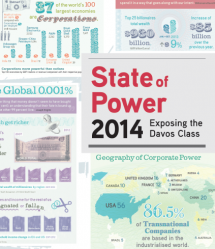Ideas into movement
Boost TNI's work
50 years. Hundreds of social struggles. Countless ideas turned into movement.
Support us as we celebrate our 50th anniversary in 2024.

The UN Charter begins with “We the peoples” and affirms the “equal rights of men and women and of nations large and small”. Today the defense of those principles, though never robust, seems weaker than ever. The camel of private interests, having made itself at home in the tents of domestic political life, has today pushed its nose and much more into the rickety tents of international governance. Helping it has been a shrewd camel-trader, a broker of corporate ideas and networks, the World Economic Forum (WEF). Its annual invitation-only gatherings in Davos, Switzerland, have given rise to the half-mocking term “Davos Man”. That archetype represents a global elite who “have little need for national loyalty, view national boundaries as obstacles that thankfully are vanishing, and see national governments as residues from the past whose only useful function is to facilitate the elite’s global operations.”

This chapter pursues several storylines converging around a simple proposition widely held in the private sector and vigorously pushed by the WEF: When it comes to tackling global problems, nation-states and their public politics are not up to the job. Their old, run-down institutions should be re-fitted to serve a sleek new system in which ‘stakeholders’ –- that is, governments, ‘civil society’ and business, chiefly as represented by transnational corporations –- will together manage the world’s affairs. Nation-states are to become just one participant among several holding authority over us all.
That scenario is no dystopian fiction from a crackpot scribbler. On the contrary it is a carefully-wrought piece of political engineering formulated by hundreds of well-paid, well-adjusted but powerful people. One of its working prototypes has been running for years already: the WEF’s annual gathering at Davos. At those elite events, business chieftains get to schmooze with senior politicians and a few members of ‘civil society’, the participants of which are carefully selected to minimize risks of any unpleasantness. Davos meetings exemplify perfectly the stakeholder approach. Across many fields of transnational governance, noted later in this chapter, that approach is now gaining altitude.
A comprehensive plan whereby ‘stakeholders’ would run the world began to take shape in 2009 when the WEF started its Global Redesign Initiative (GRI). Seizing an opportune moment –- the West’s economy in crisis, its political classes disoriented -- the WEF set off “to stimulate a strategic thought process among all stakeholders about ways in which international institutions and arrangements should be adapted to contemporary challenges.” Bankrolled mainly from Qatar (yes the same Qatar that bankrolls jihadists in Syria, Mali and other war zones), the GRI enlisted services of some 1200 experts, most grouped in the WEF’s theme- or region-focused ‘Global Agenda Councils’ around the world. In 2010, after running some ideas past “ministers, CEOs, heads of NGOs and trade unions, leading academics and other members of the Davos community” the WEF published a massive final report of the GRI, Everybody’s Business: Strengthening International Cooperation in a More Interdependent World.
Ranging across issues as varied as Chronic Diseases, Ocean Governance and Systemic Financial Risk, the GRI report argues that the stakeholder approach is the way to go in just about every field of policy -- global finance excepted. Its proposals are premised on voluntarism, codes of conduct and other kinds of soft law. Public guarantees and hard law are unwelcome –- except where corporate interests may be at risk . 2 Yes, corporations have to be part of global authority. But no, nothing is mandatory for them. They are free to walk away if they choose. Duties and obligations are for others to assume.
An essential sub-text, articulated by the WEF’s Global Agenda Council on the Future of Government, is that governing today is no longer a matter for states and their agents alone, nor should it be. Government’s “basic ‘public functions’ have already been redefined through the irrepressible growth of both private sector and civil society involvement in public affairs.” Hence the challenge ahead is to “re-invent government as a tool for the joint creation of public value.” The term “joint creation” refers to such things as public-private partnerships (PPPs). Never mind the lack of evidence that PPPs routinely deliver ‘value for money’, let alone evidence that they fairly apportion costs and risks between public and private interests. On the contrary, a British Parliamentary Committee recently found that Britain’s flagship PPP, the Private Finance Initiative, effectively ripped off British taxpayers while enriching private financiers. Corporations thus prefer PPPs, while cash-strapped or ‘captured’ public authorities (and some NGOs) go along in the public-private “joint creation” tide. On global levels, the democratic deficits of PPPs raise even more serious challenges.
This essay was published in the State of Power 2014.